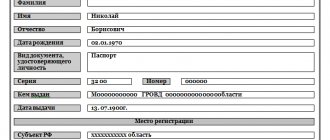Signs of a developer's impending bankruptcy
In our realities, to be on the safe side, it is best to check from time to time how construction is progressing so as not to miss possible signs of an impending problem. If work has been suspended and the facility is not ready for delivery by the deadline specified in the equity participation agreement (DPA), this is a serious cause for concern.
Among the indirect signs that very soon the company will go bankrupt during shared construction:
- stopping the work of the company's office, ignoring phone calls;
- long delay in handing over the apartment to the buyer upon completion of construction;
- loss of rights by the company to a plot of land that was allocated for the construction of a house.
Shareholders should first contact representatives of the construction company in the form of a written complaint. As for further actions, they directly depend on the stage of construction and the reasons why it was suspended.
If the company is at the stage of bankruptcy or has already been declared insolvent, then you should hurry up and declare to the court that the developer has not fulfilled his obligations under the contract. This must be done before a final decision is made.
What should defrauded shareholders do if a developer goes bankrupt?
After an announcement about the bankruptcy of the developer has appeared in official information sources and a corresponding notification from the manager has been sent to your postal address, you must, within three months, decide what you want: money or an apartment, and then state your demands indicating the chosen option .
If you decide to receive money, your application is entered into the “Register of Claims of Construction Participants”. After which the price of the residential property, as stipulated in your contract, must be established by an independent appraiser, who is hired by the bankruptcy trustee at the expense of the developer. After the assessment, the report is sent to you for review and, if you are not satisfied with it, you can always challenge it in court, including on the basis of another assessment report. If you choose the option of obtaining an apartment, your application is included in the “Register of Requirements for the Transfer of Premises”. And here there are some peculiarities:
- when the residential complex is put into operation, you have every reason to qualify for the property;
- when the house is not ready for use, the law provides for the option of completing construction by transferring the unfinished construction project to a housing construction cooperative or other consumer cooperative. You need to understand that this process can be very lengthy and difficult.
In this regard, it is difficult to determine exactly what is better: choosing an apartment or demanding money. Each specific situation is individual and requires a comprehensive assessment and comprehensive analysis.
FOR MORE DETAILS, follow the link to material about the protection of shareholders on our website
Legal side of the matter
The company's bankruptcy case will be sent to the arbitration court. The whole process consists of several stages and can last more than 12 months. Most often, such trials are divided into two stages:
- Observation. At this stage, preparation and collection of information about the developer’s activities takes place. A temporary manager is appointed for the company, whose responsibilities include, in addition to monitoring the company, also financial analysis. After a certain period (often no more than 6 months), the organization either continues to operate normally or must be liquidated.
- Competition proceedings. By court decision, the directors of the enterprise are removed from management. In their place, bankruptcy trustees are appointed.
Federal Law No. 127 (on bankruptcy) covers in detail the procedure by which an organization is declared insolvent. It contains everything about the guarantees of victims and what rights shareholders have, as well as the possibility of:
- choose a monetary form of compensation or receive housing in the form in which it is at the time of the organization’s bankruptcy;
- organize and hold a general meeting of creditors;
- transfer apartments to owners in several ways.
Actions of a shareholder in case of bankruptcy of a developer
The procedure for declaring a developer bankrupt is usually initiated by one of its main creditors - for example, the bank that provided the funds. The law instructs the Arbitration Court, which is engaged in this practice, through the arbitration manager, to notify all participants in shared construction about the start of proceedings in the case. The deadline for submitting claims by construction participants is 30 days, it begins to be calculated from the date of notification to them by the temporary or bankruptcy manager. It is permissible to raise the issue of restoring the deadline for closing the register (Resolution of the Presidium of the Supreme Arbitration Court of the Russian Federation dated April 23, 2013 N 14452/12 in case N A 82-730/2010-30-B/11-33 t).
So, what to do if the developer is bankrupt?
- Determine the requirements for the debtor. The citizen must decide whether to require the developer to return the money invested in construction or to transfer ownership of the housing in the form in which it is at this stage;
- Contact the Arbitration Court at the place of residence of the shareholder or at the location of the property. The court will need to provide a written statement from the shareholder to include his claims in the so-called register of creditors' claims. Comprehensive evidence of the fact of full or partial payment under the contract is also required. If a citizen does not have the appropriate documents, he does not have the right to apply for the transfer of housing or monetary compensation (Clause 2 of Article 201.6 of Law No. 127-FZ);
- File a claim in a court of general jurisdiction if the shareholder believes that the bankruptcy of the construction company has brought him other losses (for example, moral damage), or if he plans to recover any additional penalty or fine;
- Wait for the court's decision.
Register of creditors
At the observation stage, two registers are opened. One for those who want to eventually get their housing, and the other for those who demand a refund. After opening these registers, the commissioner must send letters to all shareholders indicating that they have the opportunity to present claims to the developer.
In order for your name to be included in the register of creditors, you must submit a corresponding application to the temporary manager. If the procedure began at the observation stage, you have a month to do this, if at the bankruptcy stage, then two. Letters do not always arrive on time, so it is better to check the official arbitration website to be aware of what decision was made regarding your developer.
Based on the transfer of the company and the project to external management, construction participants with an equity participation agreement have the opportunity to unilaterally refuse to fulfill their obligations under the agreement. To do this, you need to decide on the requirements. If you want to return the money paid for the apartment, you must submit an application stating that you renounce the DDU. The application must indicate the following:
- DDU number and date of signing;
- information about the construction company and its manager;
- information about the property;
- arbitration court;
- a copy of the receipt confirming payment for housing;
- evidence that the contractor cannot fulfill previously assumed obligations.
In the envelope with the letter for the court, you must also add a document that confirms that you sent the letter to the developer and manager.
What should a shareholder do in the event of bankruptcy of a developer?
Bankruptcy of a company is a special procedure carried out by the Arbitration Court. The purpose of the process is to confirm the developer’s inability to fulfill his obligations, as well as to satisfy the claims of shareholders and other creditors.
Once financial insolvency proceedings have been initiated, investors who signed the share participation agreement are notified. The document specifies the right of shareholders to demand the transfer of ownership of the apartment or the return of money previously transferred.
Subsequent events depend on which stage the construction work is at. So, if the house has already been built, the issue is resolved by the Arbitration Court. After this, the shareholder receives documents confirming the transfer of money to the construction company. In addition, a special register of creditors is formed, according to which the ownership of real estate is registered.
The situation is more complicated if the building has not yet been put into operation. In this case, bankruptcy proceedings are organized, after which shareholders can count on compensation. But it is worth considering that the requirements of ordinary participants in the DDU are not fulfilled in the first place. First, payments are made to persons whose health has suffered due to the bankruptcy of a construction company. Afterwards, wage debts to employees are repaid, and at the last stage, settlements with shareholders are made.
According to the law, buyers of apartments under the DDU are the most protected, because they have the right to demand not only a penalty from a bankrupt developer, but also other payments - moral compensation, covering rental costs, payment of fees, bank interest, and so on.
Federal Law No. 214 also stipulates the need for compulsory insurance, which allows one to count on covering the shareholder’s losses in the event of the financial insolvency of the developer or delay in delivery of the property. But even here, not everything is smooth, because a construction company cannot always cope with the obligations assigned to it.
See also: “Developer’s Account” will become more user-friendly
Transfer of the construction project
In the event that the court has declared the company insolvent, the law provides several ways in which housing can be transferred to buyers. So, here's what the court can do under the law:
- Recognize the shareholder's ownership of the housing.
Please note that in order for shareholders to receive property rights, two mandatory conditions must be met:
- the developer managed to obtain permission to put the house into operation;
- the acceptance certificate was signed before the developer’s application for bankruptcy status was received.
If the transfer and acceptance deed was signed later, then the chances of satisfying the shareholders’ demands largely depend on the talent, experience and skill of the lawyers.
- Transfer the residential premises to the buyer.
When one of the conditions is met - permission to put the house into operation has been received, but the acceptance certificate has not been signed - the residential premises can still be transferred to the buyers. However, for this you need to meet some conditions:
- most of the fourth priority creditors agree;
- the cost of the property remaining after the transfer of apartments to shareholders covers the amount of mandatory expenses;
- the construction project has not been laid down;
- There are enough apartments available to satisfy the requirements of all shareholders participating in the project.
- Give the unfinished house to the lenders so they can complete the construction themselves.
This option is considered the most expensive. Shareholders will have to invest more of their own funds to complete the construction. If we are talking about a facility at the initial stage of construction, there is practically no chance of successful completion of the project.
This option for resolving the problem in the law appeared only a few years ago, so there is not yet enough judicial practice by which to judge its effectiveness in resolving bankruptcy cases.
- Transfer the facility to a new contractor.
A change of developer implies that the new construction company assumes its own responsibility for fulfilling all obligations of the old developer in full.
What awaits equity holders in the event of a developer’s bankruptcy?
During the bankruptcy of the developer, within a reasonable time, the Fund for the Protection of the Rights of Shareholders makes a decision on financing unfinished construction projects. The activities of the organization are regulated by Federal Law No. 218 of July 29, 2017. The company acts as an insurer and is authorized to form a compensation fund, cover the developer’s obligations and compensate shareholders’ expenses in the event of bankruptcy.
Consequences and actions of the shareholder:
- Copies of the equity participation agreement , payment orders and cash orders, and passports are sent to the bankruptcy trustee’s address;
- Together with the documents, an application is sent with a request for inclusion in the “Register of Creditors’ Claims”;
- in the application, the shareholder indicates claims for residential premises or a demand for the return of funds;
- within 30 days the application is considered , within another 15 days the information is entered into the register;
- no later than 4 months from the date of publication of the bankruptcy, a meeting of creditors and an analysis of the financial situation of the development are held;
- auctions for the sale of the developer's property last up to 12 months , the proceeds are used to compensate the claims of the register participants;
- if the agreement with the shareholder is concluded after 2020, then the remaining amount of losses is covered by the Fund.
During the construction of the facility, the developer makes regular contributions to the compensation fund. If the shareholder decides to wait for the property to be transferred into operation, he forms a construction and housing cooperative, or the territorial authorities search for a new developer. In this case, the share participation agreement is not terminated, and the participants do not have the right to demand a refund of funds.

This is possible only if a decision is made on the advisability of financing activities for the completion of an unfinished construction project, which is made by the collegial composition of the Fund in accordance with the Rules. An additional agreement governing the terms of interaction with the new developer is attached to the current contract.
Probability of refund
When a construction company receives bankruptcy status, equity holders are faced with a rather difficult choice: to receive housing or monetary compensation. When making a decision, you should focus on what stage the construction is at.
If a lot of investment is required to complete the project, then the chances of successful completion of construction are minimal - it makes sense to terminate the contract and try to receive compensation for moral and material damage.
In any other situation, attempts to return funds can be considered the most undesirable scenario for the shareholder, since the risk of spending a lot of time and effort, but being left with nothing, is quite high.
When you go to court with a request for a refund, you give up your ownership rights to the apartment, and you do not have a 100% guarantee that the court will rule in your favor. This is why experts most often advise against terminating the DDU agreement. Ownership of real estate, even if unfinished, is better than being left without everything.
Compensation for damage
When a construction company is declared bankrupt, it is time to seek compensation for damages. You can calculate the amount by estimating the difference between what the average market value of the apartment was at the time of purchase and what it was when the company received bankruptcy status.
For an accurate assessment, you can use the services of a professional appraiser, and the cost of his services can also be included in the amount of compensation. The result obtained should be indicated in the application to include you in the register of creditors.
Shareholders must have full information on how to protect their rights and receive full compensation for damages. You can apply for a refund in the following ways:
- Register of creditors. The procedure for including a shareholder in the register has already been described above.
- Developer's insurance company. Construction companies must insure their liability. If you decide to use bankruptcy insurance for your construction company to compensate for losses, you will need a court decision according to which an insured event occurred - the developer was declared bankrupt.
- Shareholder Protection Fund. Since 2020, each construction company is required to contribute a certain amount to a special fund. The funds accumulated there are used to cover the disastrous consequences of the work of unscrupulous developers.
- Developer's guarantor. Home buyers can contact the construction company's guarantor to claim compensation. If the requirement is satisfied in whole or in part, then it is necessary to change your requirements for the developer as stated in the register accordingly.
- The executive authority that issued the construction permit. According to Federal Law No. 214, shareholders can protect their violated rights by applying to the relevant body of a constituent entity of the Russian Federation with an application. It should indicate the items from the DDU that were not fulfilled by the developer. After this, shareholders will be included in the federal register.
Mortgage payment in case of bankruptcy of the developer
If you purchased an apartment in a building under construction with credit funds, then a logical question arises: what to do with the mortgage if the construction company goes bankrupt? First of all, it is important to remember the main thing: the bankruptcy of a company is not a reason to unilaterally stop fulfilling obligations under a mortgage agreement.
The process of housing construction connects only the equity holder and the developer, and the bank is a third party. If the buyer paid the full cost of the apartment from credit funds, and the construction company squandered the money for other purposes, then the bank is not to blame for this.
At the same time, there is a valid agreement between the credited shareholder and the credit institution on the return of funds. If construction stops, your debt to the bank will continue to exist, which means that you will have to make mortgage payments on schedule.
Protection of shareholders in the event of bankruptcy of a developer
A shareholder who has invested money in housing construction must actively monitor the process of the developer fulfilling its obligations under the contract. Otherwise, if you let the situation get out of control, you can lose your investments and be left without an apartment. It is necessary to regularly communicate with representatives of the developer and other shareholders in order to find out about financial or other difficulties if they arise. After all, resolving the issue with an apartment before the developer is declared bankrupt is much easier than when this process has already started.
If, nevertheless, the moment is missed and the developer has already begun bankruptcy proceedings, it is best for the shareholder to enlist the support of a lawyer for shared-equity construction or delve into the intricacies of bankruptcy legislation in the field of shared-equity construction himself.









